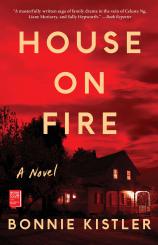Reading Group Guide
Discussion Questions
House on Fire

1. The novel’s title HOUSE ON FIRE echoes the proverb “A liar’s house is on fire but no one believes him” (pp. 200–201). What do you think is the significance of this maxim in the book, and why did Bonnie Kistler choose this phrase for the title?
2. Pete seriously contemplates sending Kip to Canada to escape prosecution. Would you consider doing that for your child or another family member?
3. HOUSE ON FIRE is told in the alternating voices of Leigh and Pete, and occasionally even Kip. What do the shifting perspectives add to your understanding of the characters? If this story were limited to only one viewpoint, whose would you pick? How would that change the overall story?
4. Compare Pete’s and Leigh’s parenting styles. Do you think either of them is too strict or too lenient? How is their parenting influenced by their previous marriages? How are they affected by each other’s approaches to parenting?
5. Leigh is haunted by visions of Chrissy when she looks at Kip, making it painful for her to be around him. Do you see any pattern as to when Leigh is struck by these visions? What do you think these transformations signify?
6. When Leigh attends Stephen’s lecture, he discusses different schools of thought on the ethics of lying. Do you think lying is always wrong, and if not, when is it acceptable? Consider the lies told by Kip, Stephen and Leigh. Do you believe any of these qualified as a good lie?
7. When Kip is arrested for drunk driving, Shelby tells Leigh, “Try not to worry.... Even Hardass Harrison isn’t going to throw the book at a nice white boy” (p. 14). What is the role of race and class in HOUSE ON FIRE? Where do you see it influencing the plot or how characters respond to different situations?
8. People often insist that one should never speak ill of the dead. Do you agree with this maxim? Why do you think it is so painful to admit that those we have lost were not perfect?
9. Leigh reflects upon the extended mourning rituals of long ago and contrasts them with present-day norms when we’re expected to get on with our lives fairly soon. How has mourning been observed in your family, or among your friends? Do you think modern life allows enough time for grieving?
10. Shelby sums up Leigh and Pete’s marital problems this way: Leigh’s daughter died, and her husband left her; Pete’s son got arrested, and his wife kicked him out. Which of those seems closer to the truth? How would you phrase what happened to capture the fullest sense of their difficulties?
11. Over the course of the novel, there are several instances in which legal logic and its complications are laid bare, such as the parental preference doctrine (p. 183). Did any of the explanations for the reasoning behind these laws and how they can be applied surprise you?
12. While reading, did you believe Kip’s claims about the night of the accident? Why, or why not? If Leigh never came to believe Kip’s story, would they have been able to move past it? Discuss how that might have played out.
House on Fire
- Publication Date: December 3, 2019
- Genres: Fiction
- Paperback: 416 pages
- Publisher: Atria Books
- ISBN-10: 1501198696
- ISBN-13: 9781501198694







